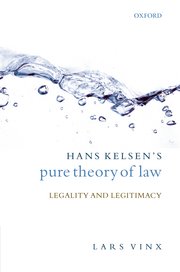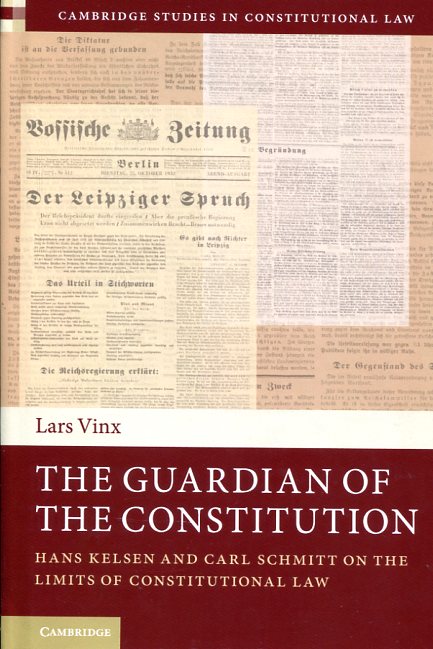Hans Kelsen's pure theory of Law
legality and legitimacy
- ISBN: 9780199227952
- Editorial: Oxford University Press
- Fecha de la edición: 2007
- Lugar de la edición: Oxford. Reino Unido
- Encuadernación: Cartoné
- Medidas: 24 cm
- Nº Pág.: 225
- Idiomas: Inglés

Hans Kelsen is commonly considered to be among the founding fathers of modern legal philosophy. Despite Kelsen's prominence as a legal theorist, his political theory has so far been mostly overlooked. This book argues that Kelsen's legal theory, the Pure Theory of Law, needs to be read in the context of Kelsen's political theory. It offers the first comprehensive interpretation of the Pure Theory that makes systematic use of Kelsen's conception of the rule of law, of his theory of democracy, his defense of constitutional review, and his views on international law. Once it is read in the context of Kelsen's political works, Kelsen's analysis of legal normativity provides us with a notion of political legitimacy that is distinct from any comprehensive and contestable theory of justice. It shows how members of pluralist societies can reasonably acknowledge the binding nature of law, even where its content does
not fully accord with their own substantive views of the requirements of justice, provided it is created in accordance with an ideal of fair arbitration amongst social groups. This result leads to a fundamental re-evaluation of the Pure Theory of Law. The theory is best understood as an attempt to find a middle ground between natural law and legal positivism. Later positivist legal theorists inspired by Kelsen's work failed to appreciate the political-theoretical context of the Pure Theory and turned to a narrow instrumentalism about the functions of law. The perspective on Kelsen offered in this book aims to reconnect positivist legal thought with normative political theory.
ÍNDICE:
1: Introduction
Three paradigms of legal positivism
Kelsen's legal science
Kelsen's legal politics and the identity of law and state
Democracy, constitutionalism, and legal peace in Kelsen's utopia of legality
2: The Pure Theory of Law - Science or Political theory?
Law and Nature - Subjective and Objective Legal Meaning
Kelsen's theory of legal order
Kelsen and theoretical anarchism: The pure theory as critique of ideology
Conclusions on Law and Nature
Law and Morality
The pure theory as a theory of legal legitimacy
Kelsen and the separation of law and morality
Further questions
3: Kelsen's Principles of Legality
Legal hierarchy and depersonalization of the state
Kelsen's principle of legality I: Nullity
Kelsen's principle of legality II: Voidability
The sovereignty of law: The doctrine of normative alternatives reconsidered
Further questions
4: Kelsen's Theory of Democracy - Reconciliation with Social Order
Kelsen on the 'torment of heteronomy'
The failure of the argument from deliverance
Kelsen's defense of majority rule: The argument from reconciliation
Freedom and Compromise: Democracy and constitutional entrenchment
Kelsen's relativism
5: Democratic Constitutionalism - Kelsen's Theory of Constitutional Review
Kelsen's conception of adjudication: Implications for a theory of review
Kelsen on the concept of constitution
Constitutional values and judicial role
6: Kelsen's Legal Cosmopolitanism
Kelsen and the dogma of sovereignty
Kelsen's doctrine of the unity of law - a defence
On the viability of legal cosmopolitanism
The moral relevance of Kelsen's legal cosmopolitanism
VII: Conclusions - The Pure Theory of Law and Contemporary Positivism







